Losing something while traveling is one of the biggest fears—but if it’s your smartphone, it’s even more heart-wrenching. Photos, contacts, maps, itinerary—everything is inside. I actually lost mine in Japan, and the outcome was filled with surprise and gratitude.
It happened on Tokyo’s subway system. In the rush of changing trains, I must’ve dropped it from my pocket. Only realized a few stops later when I opened my bag and saw it was gone. My mind went blank. My English isn’t perfect. I didn’t know where I lost it. I had no idea how to track it down.
At the ticket gate, I approached a station attendant. Despite my broken English, she remained calm and helpful. She handed me a form to fill in the approximate time, location, phone color, model—everything. Then she radioed somewhere. “Please wait a moment,” she said. Minutes later, I heard the incredible news: “A phone matching this description has been turned in at a station two stops ahead.”
Still in disbelief, I was guided to the lost-and-found. There it was—my phone, perfectly preserved, as if nothing had happened. Someone had found it and handed it in. The screen was unblemished, the passcode untouched—fully intact.

This wasn’t just about retrieving a lost item—it was a profound experience. Someone I didn’t even know took the time to hand my phone to a station attendant, and in Japan, that action wasn’t unusual; it was simply part of everyday life. Being gently reassured with a calm, “It’s all right,” without blame or judgment—that kind of warmth became the very definition of anshin, the sense of security I found during my travels.
In Japan, it’s common for lost items—phones, wallets, passports—to be returned to their owners. Police boxes and train stations have well-organized lost-and-found systems, complete with formal records and owner-verification processes. What stood out to me was that the finder rarely asks for credit or compensation. Here, there’s an unspoken trust: the person who loses something, and the person who finds it, both rely on a shared sense of responsibility.
At the heart of this cultural norm is a deep respect for other people’s belongings and a strong awareness not to burden others. When something is lost, no one just walks by—it’s simply returned. It’s not grand or attention-seeking, but it keeps society functioning smoothly. Even as a visitor, I felt included in this cycle of care, which filled me with gratitude and comfort.
As I walked out of the station with my phone, the station staff’s genuine smiles, their considerate handling of the matter, and the selfless act of the finder all came to mind. In that moment, Tokyo‘s cityscape looked a little brighter. I realized that amid the concrete and noise, genuine kindness thrives here.
When I return to Japan next time, I hope to pay it forward—to become the person who finds something and takes it to a lost-and-found. I want to participate in this circle of kindness. Japan’s culture of returning lost items isn’t just about physical objects—it reflects a society built on trust.




